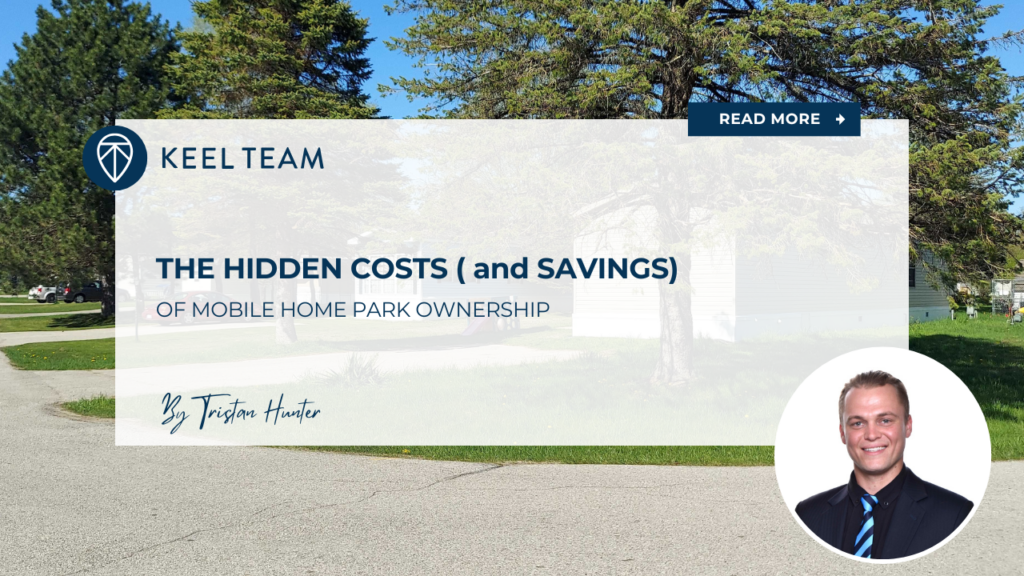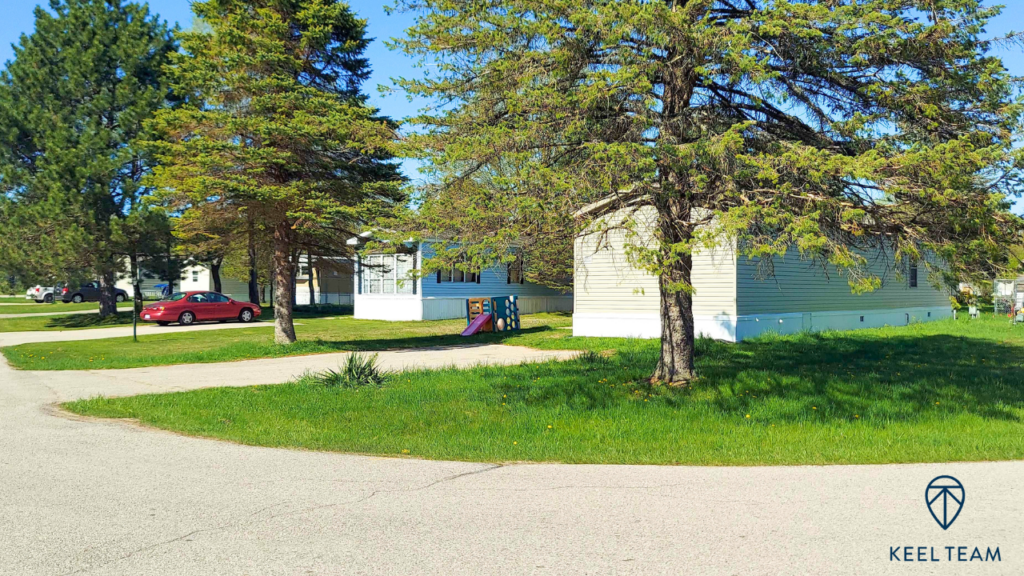The Hidden Costs (and Savings) of Mobile Home Park Ownership
-
 Tristan Hunter - Investor Relations
Tristan Hunter - Investor Relations

Mobile home park ownership offers an appealing investment opportunity. However, it typically comes with both costs and savings that owners should understand. By carefully managing expenses and identifying ways to improve efficiency, you may significantly impact your net operating income (NOI).
Breaking Down Key Expenses
Owning a mobile home park involves several recurring costs. These include utilities, maintenance, management, and taxes. Each expense requires attention, as they can quickly add up without proper oversight.
1. Utility Costs
Utility expenses are often a substantial part of mobile home park ownership. These typically include water, sewer, electricity, and trash services. Owners sometimes absorb these costs on behalf of their residents, but this is not always necessary.
One way to manage utility costs is through submetering. By installing submeters, owners can bill residents directly for their water and sewer usage. This approach may encourage more mindful consumption, reducing overall expenses. Another option involves utility bill-back systems, where the owner distributes costs back to residents.
2. Maintenance and Repairs
Maintenance expenses are inevitable. These range from minor repairs to larger projects like road resurfacing or tree trimming. Regular upkeep helps ensure the mobile home park remains attractive to tenants.
For larger maintenance tasks, budgeting in advance can make these expenses more manageable. Some owners opt to create reserve funds for unexpected repairs. Preventative maintenance is another cost-saving measure. Regular inspections of infrastructure, such as plumbing and electrical systems, can help catch issues early.
3. Management Costs
Management costs vary depending on whether the owner self-manages or hires a third-party company. Professional property management may involve higher upfront costs but often leads to more efficient operations.
For owners managing their own mobile home parks, time investment becomes a factor. Tasks like collecting rent, handling complaints, and overseeing maintenance require effort. However, technology may help streamline management. Software solutions for rent collection and resident communication can reduce time spent on administrative tasks.
Download our FREE eBook on the Top 20 things to know BEFORE investing in mobile home parks!
Opportunities for Savings
While there are costs to consider, mobile home park ownership also usually presents opportunities for savings. By optimizing certain areas, you may reduce expenses and increase profitability potential.
1. Utility Bill-Back Systems
One of the most effective ways to save is through utility bill-back systems. This practice shifts the cost of utilities to residents. It usually reduces the owner’s financial burden and also encourages tenants to use resources wisely.
When implementing this system, clear communication with residents is key. Transparency about the costs and how they are calculated can help avoid misunderstandings.
2. Tenant-Owned Homes
Encouraging residents to own their homes rather than renting them can lead to savings. When residents own their homes, the mobile home park owner is not responsible for interior maintenance or home repairs. This typically reduces the overall workload and associated costs.
Additionally, tenant-owned homes tend to result in longer stays. This can minimize turnover-related expenses like marketing or preparing lots for new tenants.
3. Streamlined Operations
Operational efficiency can lead to noticeable savings. By using property management software, owners may reduce administrative costs and save time. Digital solutions for tracking payments, managing maintenance requests, and communicating with residents are widely available.
Some owners also find savings by negotiating service contracts. For example, securing competitive rates for trash collection or landscaping services can lower recurring expenses.
The Impact of Improvements on NOI
Investing in improvements for your mobile home park might boost NOI and value over time. While initial costs may feel significant, the long-term benefits can outweigh these expenses.
1. Upgrading Infrastructure
Infrastructure upgrades, such as upgrading outdated water or sewer systems, can improve efficiency. Modern systems may reduce utility expenses and prevent costly repairs down the line.
In some cases, improved infrastructure might justify higher lot rents. Tenants often value well-maintained facilities, which could make your mobile home park more competitive.
2. Increasing Lot Rent
One way to improve the profitability of a mobile home park is by increasing lot rent. While this approach may require careful consideration, it has the potential to significantly impact NOI.
Owners can justify rent increases by offering improved infrastructure, better amenities, or enhanced conditions. Transparent communication with residents is crucial during this process. Sharing detailed reasons for the increase, such as rising operational costs or recent upgrades, can help ease concerns and foster understanding. Additionally, gradual rent adjustments over time may be more manageable for residents, likely reducing the risk of high turnover.
3. Billing Back Utilities
Utility bill-back systems, as mentioned earlier, represent another effective strategy for potentially improving NOI. This practice involves allocating utility costs to residents, either through direct submetering or a proportional bill-back system.
Billing back utilities typically reduces the owner’s financial burden and promotes mindful resource usage among tenants. Many residents appreciate the transparency of paying for only what they use. Moreover, utility bill-back systems can lead to noticeable savings for owners, likely reducing the overall expense bill and improving NOI.

Navigating Hidden Costs
Some costs associated with mobile home park ownership are less obvious. These hidden costs can impact profitability if not properly accounted for.
1. Regulatory Compliance
Compliance with local, state, and federal regulations can lead to unexpected expenses. For example, environmental regulations may require upgrades to water or sewer systems. Regularly reviewing regulations and consulting legal professionals may help avoid fines or costly retrofits.
2. Insurance Costs
Insurance premiums may vary depending on the location and size of the mobile home park. Owners should evaluate policies carefully to ensure adequate coverage. Investing in preventative measures, like installing fire hydrants or security systems, might reduce insurance costs.
3. Tenant Turnover
High tenant turnover can lead to unexpected expenses. Preparing lots for new tenants and marketing vacant homes takes time and money. Creating a positive tenant experience might help minimize turnover rates.
Final Thoughts
Mobile home park ownership involves balancing costs and savings. With careful planning and efficient management, you may optimize operations and maximize profitability potential. Regularly reviewing your expenses and identifying areas for improvement can make a significant difference.
While hidden costs like regulatory compliance and turnover can affect NOI, there are opportunities to save. Strategies like utility bill-back systems and encouraging tenant-owned homes may help reduce financial strain. Investing in infrastructure and amenities can further enhance the value potential of your mobile home park.
Ultimately, understanding both the expenses and savings unique to mobile home park ownership can be essential. With the right approach, this investment may provide stable return potential and long-term growth opportunities.
Are you looking for MORE information? Book a 1-on-1 consultation with Andrew Keel to discuss:
- A mobile home park deal review
- Due diligence questions
- How to raise capital from investors
- Mistakes to avoid, and more!
Disclaimer:
The information provided is for informational purposes only and is not investment advice or a guarantee of any kind. We do not guarantee profitability. Make investment decisions based on your own research and consult registered financial and legal professionals. We are not registered financial or legal professionals and do not provide personalized investment recommendations.

Tristan Hunter - Investor Relations
View The Previous or Next Post
Subscribe Below 👇





